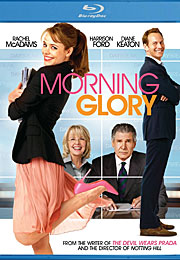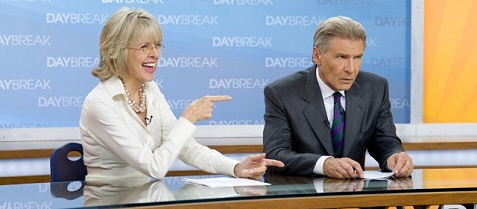 The world has been debating news and entertainment for years,” perky young morning show producer Becky Fuller (Rachel McAdams) tells stodgy, curmudgeonly news anchor Mike Pomeroy (Harrison Ford) in Roger Michell’s “Morning Glory.” “And guess what, Mike? Your side lost.”
The world has been debating news and entertainment for years,” perky young morning show producer Becky Fuller (Rachel McAdams) tells stodgy, curmudgeonly news anchor Mike Pomeroy (Harrison Ford) in Roger Michell’s “Morning Glory.” “And guess what, Mike? Your side lost.”
“Morning Glory,” the new romantic comedy from the director of “Notting Hill” and “Changing Lanes,” is not a trenchant commentary on media criticism, despite taking place in the often-criticized, vacuous world of morning television. More importantly, though, it’s also not your standard mainstream romantic comedy, deftly focusing more on the female protagonist’s desire to advance her career than acting as Doorstop #1 for her charming beau.
When Becky is fired from her producer role on a local New Jersey morning show, she’s quickly picked up by fictional network IBS to executive produce “Daybreak,” a long-running, yet beleaguered, show currently in last place in the ratings. (“Half the people lost their remotes; the other half are waiting for their nurses to turn them over,” quips Pomeroy of the show’s viewership). After quickly making drastic changes to the program – including the firing of an arrogant lead anchor – Becky has to scramble to find a co-anchor for Colleen Peck (Diane Keaton), an aging, bitter television host who’s been through this “dog-and-pony show” time and again.

Enter Mike, a Tom Brokaw type whose esteem in the industry is equaled only by his temperament. (He’s been known to slap former producers and call co-workers “animatronic puppet assholes.”) Through a contract loophole, Becky convinces and subsequently forces the serious newsman to join the frivolous, failing morning show. Tension and wackiness ensues. When network executive Jerry Barnes (Jeff Goldblum, as solid as ever) eventually tells Becky that the show will be cancelled if ratings aren’t improved immediately, Becky finally realizes what everyone under 35 has known for years: if you want the ratings, court the YouTube (read: under 35) crowd.
“The Devil Wears Prada,” which shares the same screenwriter as “Glory, ” is the obvious, yet most accurate, comparison. Like Anne Hathaway’s Andrea Sachs, McAdams plays Becky with wide-eyed optimism and naïveté, confident about changing an immutable system and assured that little things like egos and infighting are pesky little roadblocks on the path to eternal happiness for all. 22-year-olds will relate; anyone over 30 will nostalgically recall when they believed that too.
Throughout the film, McAdams comes off as a cross between Hathaway and a female Hugh Grant; as Becky rambles, stutters and bumbles both with her new co-workers and Adam Bennett (Patrick Wilson), a suave, good-looking producer who Becky quickly falls for. That Adam is window-dressing for most of the movie plays to the film’s strengths. Too often, films of this nature solely focus on the girl trying to win the guy, with producers and screenwriters just swapping out one indistinguishable career backdrop for another. Here, the salvaging of a failing show holds more currency than any future – or lack thereof – with the hunky older man.
McAdams’ always-on enthusiasm vacillates between admirable and grating, with the hope of Becky toning it down tampered by the realization that only a Type A, round-the-clock worker bee with optimism to spare can plausibly turn the show around (if plausibility is ever a factor in romantic comedies). Keaton is relegated to the role of sidekick, but at 64, there’s still no other actress that can do wacky and disheveled like her.
But the film occasionally suffers from Standard Romantic Comedy Trope Syndrome. With the exception of Pomeroy, character development is virtually nonexistent and sacrifices itself so that the story can live. And one day, filmmakers will learn that music-laden montages are spices, not stock, meant to be used judiciously to flavor the film and not inserted every 15 minutes to allow the viewer to mentally catch up to the plot.
Somewhere in “Morning Glory” is a social commentary on the continued blurring between news and entertainment. “News is a sacred temple,” says Pomeroy, admonishing Fuller. “And you’re part of the cabal ruining it.” But that’s what “Network” is for. Still, “Morning Glory” stands one step above its tepid, vacuous peers in showing a female lead who does more than stand by her man. Which still leaves the question: If the devil does, in fact, wear Prada, does he watch “The Today Show”?
2.5 / 5 Stars
Starring: Rachel McAdams, Harrison Ford, Diane Keaton, Patrick Wilson, Jeff Goldblum
Director: Roger Michell
Reviewed by Jason Newman
Single-Disc Blu-ray Review:
You won’t find very many bonus features on Paramount’s Blu-ray release of “Morning Glory,” and considering its tepid performance at the box office, we don’t blame them. The audio commentary with director Roger Michell and writer Aline Brosh McKenna offers a lively discussion about the making of the film, but it’s nothing special, while the only other extra included is a sole deleted scene featuring Diane Keaton and Ty Burrell.


